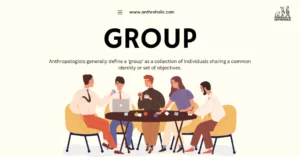AI Answer Evaluation Platform Live Now. Try Free Answer Evaluation Now
Cultural Lag
The cultural lag occurs when there is a gap between physical and intangible culture. The phrase “cultural lag” refers to both the idea that culture often lags behind technological progress and the repercussions of this lag on the socioeconomic system. If humans are unable to adjust to the fast changes in the environment and technology, a lag or gap between civilizations may occur. According to technological determinism theories, changes in technology also have an influence on social structures and cultural norms, which is coherent with what has been witnessed. Hence, technology has the possibility to have a major influence on society. But, it may not necessarily imply a relationship. The major topic of study on cultural lag is the sluggish adoption of new technologies.

Ogburn on Cultural lag
Sociologist William F. Ogburn thinks that the capacity of the material culture to spread and change swiftly and fully is what creates cultural lag, as opposed to the non-material culture’s predisposition for resistance to change and protracted stability. This is owing to the fact that altering physical items is significantly easier than changing attitudes and ideas, which is far more difficult. The contrast between these two cultural qualities makes it exceedingly difficult to adapt to contemporary technology. Such people might feel cut off from their society or culture. The divide between material and non-material culture was motivated by Ogburn’s 1922 social transformation study. The time when people had to shift as automobiles got speedier and more helpful is Ogburn’s well-known example of cultural lag. Time is required for current infrastructure repairs, particularly in light of today’s fuel-efficient automobiles. This is vital as it’s conceivable that folks who aren’t acclimated to a change may require some time to adjust. As a result, the phrase “cultural lag” is employed.
The application of the term and notion of cultural Lag. As a consequence, the degree of knowledge we presently possess in the social sciences is no longer adequate for the task of developing such a fundamental social genome.
Cultural lag in development processes
How can we organize cultural development processes better in the interim, before such knowledge is accessible, and lessen worries about cultural lag and periods of social maladjustment? How successfully can we design a mechanism by which such critical instrumental knowledge may be formed, developed, and employed in a period with a pre-paradigmatic social DNA?
The multiple dimensions of that complexity known as “sculpture” would be connected by such a system. Nevertheless, it appears that the establishment of participatory democracy is a requirement for the advancement and continued growth of such a process. It is commonly argued that industry, labor, and government must work together in a process that encourages consensus and collaboration in order to identify national goals and the means for accomplishing them in the literature important to the industrial policy issue.
Cultural lag in Democratic Society
Even though the USA has made significant progress toward a democratic society, there is still more work to be done. Considering the provision of full and equal participation in our democracy on the basis of gender, race, and class, there are still considerable issues to be handled.
Although all of this is dearly wanted, it is simply not achievable. The human race is eating bigger and larger amounts of the boundless corpus of knowledge as civilization evolves. The bounds of knowledge do not move closer; rather, they go farther and farther away. The more we study, the more we realize there is still much to learn and that we will never truly comprehend anything. Many barriers and cultural obstructions are produced as people improve their knowledge, which is kept in culture and applied as technology. Consequently, the speeding up of technology is not merely a matter of anxiety; it also improves things.
As Thurow argues, nevertheless, “No one can face a problem they refuse to recognize.”[1]
To oppose the solution is to reject the problem. The paradigmatic boundaries of conventional economic research must be employed to frame a socioeconomic examination. In this sense, the notion and theory of “culture lag” are crucial, and they need to be an intrinsic part of the continued evolution of the study of economics. In fact, the study of economics itself may be one of the greatest cultural “slags” we confront[2]. In the end, human existence may hinge on how social science evolves in the future and how it is applied to social technology. The development of improved social innovation methodology, or, to put it another way, a major acceleration of the development of actual social science, is vital for the future of civilization[3]
There have been several initiatives to combine and blend the social and economic spheres. A blend of the social and the economic is most suited to the idea and theory of cultural lag. while considering the need
Institutional adjustment is crucial to the idea and theory of cultural lag, even though it is beyond the paradigmatic boundaries of standard economic analysis. Thorstein Veblen, an economist, and William F. Ogburn, a sociologist, both used the term “cultural lag” in their views related to the processes of cultural development in an attempt to integrate the social and the economic. Ogburn looked at social development in the context of cultural evolution, while Veblen explored the mechanics of economic growth within the framework of cultural evolution.[4]
Hence, cultural lag relates to both theory and explanation as well as conceptualization: “I believe it is vital to highlight that this is a hypothesis as well as a notion of a relationship. Thus, it is more than just a novel word in the language.[5]
Cultural lag in Analysis
Cultural lag, as a notion and theory, aids in the discovery, analysis, and explanation of social concerns, as well as the prognosis and forecasting of future crises. Moreover, it could be policy-focused and lead us to certain solutions. According to the literature, the concept and notion of “cultural lag” has supplied one of the most fundamental tools for socioeconomic analysis:
One of the major ideas of modern social studies has been the cultural lag hypothesis.
American sociologists have generally accepted Veblen’s theory of cultural lag, which he invented to investigate social processes and explain both social progress and social impediments
Modern Currents in Cultural lag
Most current sociology textbooks accept cultural lag as a significant aspect of social transition. Yet, cultural lag is sometimes questioned as being unduly constructed. Introducing notions like “lags” makes a theory “so labile and so vague that it may be reconciled with practically any combination of evidence”. Nonetheless, the notion has managed to weather the storm. Given that “cultural lag” is still popular in the majority of dictionaries and textbooks, the phrase’s use, durability, and benefits are obvious.,
Considering its applicability, the very little modern discussion is notably aimed at a clear explanation of the cultural lag theory and its application to the identification and treatment of current challenges. In order to integrate and analyze the important arguments provided by both proponents and skeptics of the notion and theory of cultural lag, our objective is to assess the merits and downsides of each. With the use of this technique, we seek to explain and update the idea and theory of cultural lag.
References
[1] Thurow, L. (1992), Head to Head, William Morrow and Company, New York, NY.
[2] Kuznets, S. (1973), “Modern economic growth: findings and reflections”, American Economic Review, Vol. 63, June, pp. 247-58
[3] Allen, F.R. (1971), Socio-Cultural Dynamics: An Introduction to Social Change, Macmillan, New York, NY
[4] Ogburn, 1946, p. 10); for examples of general textbook treatment, cf., Broom et al. (1990, pp. 57-9
[5] Allport, F.H. (1924), “Social change: an analysis of Prof. Ogburn’s culture theory”, Social Forces, Vol. 2, September, pp. 671-6




